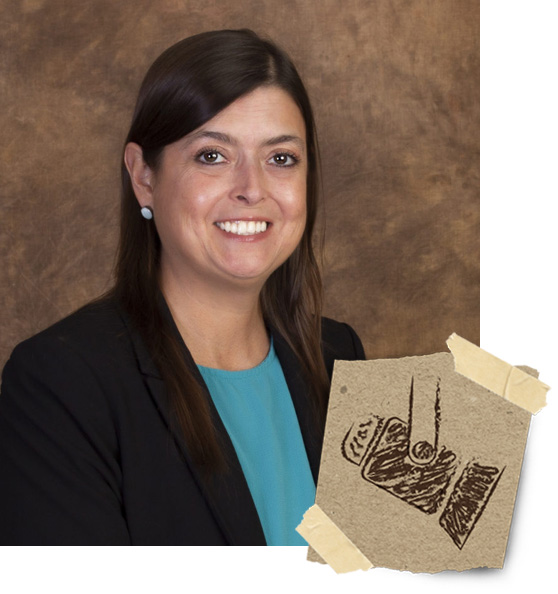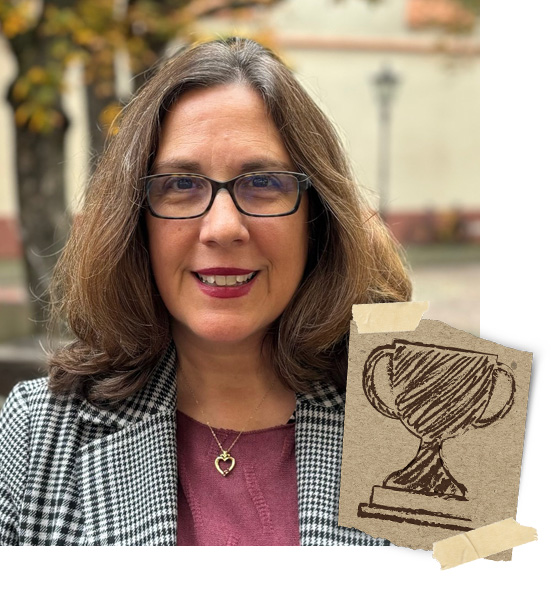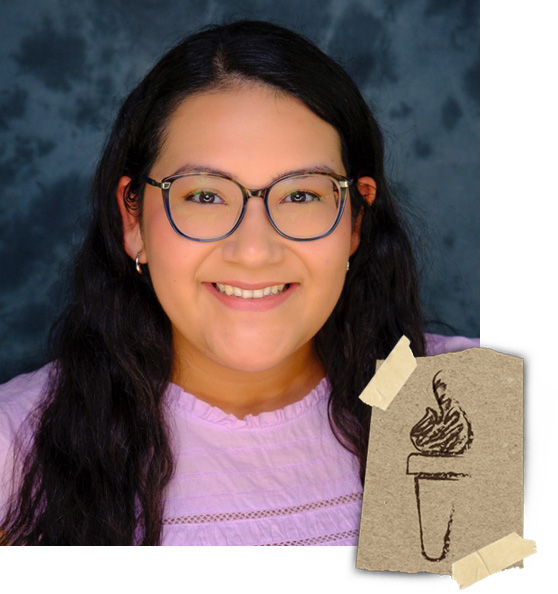Access Spotlight: Dr. Kehli Henry
November 11, 2024 - Emily Jodway
 Kehli Henry, PhD, is our Access Spotlight honoree for the month of November as we celebrate the diverse history, culture and accomplishments of our Native American and Indigenous community members. There are over 500 federally recognized tribes across the country including a dozen in the state of Michigan, each with its own unique set of shared traditions, language and customs. Henry is a proud Anishinaabekwe (Ojibwe woman), and as a researcher who has worked closely with Native American communities striving to increase awareness and improve access to a wide range of public services and programming, she is a shining example of an Access Spotlight.
Kehli Henry, PhD, is our Access Spotlight honoree for the month of November as we celebrate the diverse history, culture and accomplishments of our Native American and Indigenous community members. There are over 500 federally recognized tribes across the country including a dozen in the state of Michigan, each with its own unique set of shared traditions, language and customs. Henry is a proud Anishinaabekwe (Ojibwe woman), and as a researcher who has worked closely with Native American communities striving to increase awareness and improve access to a wide range of public services and programming, she is a shining example of an Access Spotlight.
Henry grew up and has spent most of her life in Michigan, raised in a bicultural environment with her father belonging to the White Earth Nation of Minnesota Anishinaabe and her mother being of non-native descent. Much of her extended family also resides in Michigan, with her grandparents and father all eventually working for the Saginaw Chippewa Tribe in Mount Pleasant, a community her family has since harbored strong connections with. This also influenced some of the first work that Henry herself started doing when she joined on as a summer youth crew leader at the age of 19 and continued to work in a similar capacity with education and youth-related programming for several years.
“That really strongly influenced who I am today, and my knowledge about Tribal nations, Tribal sovereignty and having that connection to a native community,” she said.
Henry also spent time as an assistant coordinator for the summer youth program, helping place kids in summer jobs and supporting them along the way, then became a teaching assistant at the Saginaw Chippewa Academy, a Tribally owned and operated school. She interned at the nearby Ziibiwing Center of Anishinaabe Culture and Lifeways, assisting with several grant projects related to the programming offered to school groups visiting the museum.
Like many students, it took Henry some time to finally decide what she wanted to do in her near future, both academically and career-wise. She began her undergrad at Michigan State but ended up transferring to Central Michigan and found an interest in anthropology, as the discipline’s focus on culture resonated with her due to her upbringing.
“Although anthropology has had a very complicated and not always positive relationship with Native communities since its inception in the United States, it’s been one of the disciplines that’s really recognized its past errors in terms of relationships and responsibilities to Native peoples, in large part in response to critiques from American Indian nations and scholars ” she said.
Henry decided to continue her education and pursue a graduate degree, hoping to delve into some of the deeper issues surrounding working with Native students in public schools. “The Western education system has a very particular kind of structure that isn’t always tailored towards Native students or other groups of students who don’t fit with the general American middle class culture,” she explained. One of her main areas of focus while pursuing her joint master’s and PhD program in Cultural and Medical Anthropology at Michigan State was health and wellness in contemporary American Indian communities, as well as the anthropology of addiction, with the opioid crisis heightening across the country.
Within the anthropology department, she counts assistant professor Heather Howard and associate professor Mindy Morgan as two of her greatest mentors during her time at MSU. Both of them have done extensive work within Native American communities. Dr. Howard’s work is rooted in community-based methods, and Henry describes both Howard and Morgan as being very impactful in terms of academics.
Before returning to Michigan State for her current position, Henry went back to the Saginaw Chippewa Tribe as a grants analyst in their Office of Grants and Contracts. One grant that she and her team worked on focused on raising awareness of youth mental health, increasing student access to services like counseling and building partnerships with local schools to train staff on various mental health topics and trauma-informed best practices. She enjoyed working on the grant so much so that she applied to be the Project Coordinator, with the grant eventually being awarded nine million dollars from the Substance Abuse and Mental Health Services Administration (SAMHSA), creating a historic partnership with the Saginaw Chippewa Tribe and two local public school districts.
“Although I was academically trained, I feel like a lot of my broader knowledge has come from working for the Saginaw Chippewa Tribe, and there are so many knowledgeable people there from all kinds of different programs,” she said.
Henry is now a Postdoctoral Research Fellow with the STEM Ed PaCER (Participatory and Community Engaged Research) Project at MSU. The project includes a multidisciplinary group of researchers from STEM backgrounds who work on STEM education and community-engaged participatory research. They also receive training to continue on in their own professional academic careers and work surrounding community-engaged research.
Henry’s current project is the development of an indigenous data sovereignty framework for doing research and evaluation in an Indigenous community.
“We’re thinking about ways that we can collect more culturally grounded data in the future and how data systems could be improved for future decision-making and planning,” she explained. “Sometimes people think about data as very quantitative and numbers-based, but Tribal communities have been learning about and passing down knowledge in other ways too, through oral histories and hands-on learning, for example.”
Their end goal is the creation of a framework that can be used for culturally grounded and community-specific data collection. The work will be guided by a Community Advisory Committee and will include ongoing conversations, listening sessions and feedback gatherings within that community to assist in the development of the framework.
Henry stressed the importance of this community engaged research, especially in the context of working with Tribal nations. Each nation has its own laws, policies and unique cultures that should be taken into account when conducting any kind of research. One of her roles with the Saginaw Chippewa Tribe was serving on the Saginaw Chippewa Data Governance Board, which brought together members and leaders from the community who worked to develop a more formal review process for future data or research requests brought to the Tribe. She also credits these communities as being drivers of the research she conducts, and that her work would not be possible without them.
“It’s not just my work, it’s community work that I was lucky enough to be involved in and to learn alongside a bunch of other people,” she said. “I think we all learned different things from each other and developed things out as a group. So even though this data sovereignty project is my project through STEM Ed PaCER, it isn’t really my project- it’s community based and community led.”
During Native American Heritage Month, and year round, Henry hopes that more awareness can be raised about the many Indigenous nations thriving in our country. She also brought up the importance of recognizing these Tribes as sovereign nations, each with their own fully operational governments that have been in existence since before the writing of the Constitutions and the inception of the United States. These groups were here and established well before U.S. cities, states and commonwealths were born. Additionally, Henry expressed how important it is to listen to our Native American and Indigenous campus population.
“There are over 570 federally recognized tribes within the borders of what is now known as the United States, and 12 in Michigan,” she said. “I’ve talked to so many people who don’t even know there are Tribal nations in Michigan. There are a lot of misconceptions about Tribes in general as there is a great diversity of Tribes and Tribal cultures across the United States, and even diversity among Tribes in Michigan ... I think Native American Heritage Month is a time that can help raise awareness of that.”
Honorees’ views are their own and do not necessarily reflect those of the College of Social Science.
Read more:

Access Champion
Faculty/Staff
Dr. Mindy Morgan
Our Access Champion, Dr. Mindy Morgan, is an Associate Professor of Anthropology and an affiliated faculty member of the American Indian Studies Program. Her research explores how Native communities perceive the relationship between Indigenous languages and English, and the use of language and literacy as cultural and historical tools within these communities.

Access Torch
Student
Jessica Saucedo
Jessica Saucedo is our November Access Torch. A Psychology graduate student in the Ecological and Community Psychology program, Saucedo's current research focuses on how engaging in Native culture and language supports the physical, cognitive, emotional, and linguistic development of three- to five-year-old children.

Access Matters
We strive to cultivate an inclusive and welcoming college environment that celebrates a diversity of people, ideas, and perspectives.

